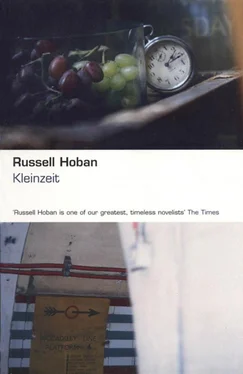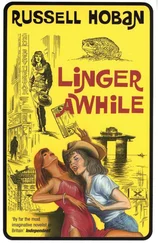Russell Hoban - Kleinzeit
Здесь есть возможность читать онлайн «Russell Hoban - Kleinzeit» весь текст электронной книги совершенно бесплатно (целиком полную версию без сокращений). В некоторых случаях можно слушать аудио, скачать через торрент в формате fb2 и присутствует краткое содержание. Год выпуска: 2002, Издательство: Bloomsbury, Жанр: Современная проза, на английском языке. Описание произведения, (предисловие) а так же отзывы посетителей доступны на портале библиотеки ЛибКат.
- Название:Kleinzeit
- Автор:
- Издательство:Bloomsbury
- Жанр:
- Год:2002
- ISBN:нет данных
- Рейтинг книги:4 / 5. Голосов: 1
-
Избранное:Добавить в избранное
- Отзывы:
-
Ваша оценка:
- 80
- 1
- 2
- 3
- 4
- 5
Kleinzeit: краткое содержание, описание и аннотация
Предлагаем к чтению аннотацию, описание, краткое содержание или предисловие (зависит от того, что написал сам автор книги «Kleinzeit»). Если вы не нашли необходимую информацию о книге — напишите в комментариях, мы постараемся отыскать её.
The Peloponnesian War
Kleinzeit — читать онлайн бесплатно полную книгу (весь текст) целиком
Ниже представлен текст книги, разбитый по страницам. Система сохранения места последней прочитанной страницы, позволяет с удобством читать онлайн бесплатно книгу «Kleinzeit», без необходимости каждый раз заново искать на чём Вы остановились. Поставьте закладку, и сможете в любой момент перейти на страницу, на которой закончили чтение.
Интервал:
Закладка:
Russell Hoban
Kleinzeit
To Jake
A to B
There it was again, like a signal along a wire. A clear brilliant flash of pain from A to B. What was A? What was B? Kleinzeit didn’t want to know. His hypotenuse was on that side, he thought. Maybe not. He’d always been afraid to look at anatomical diagrams. Muscles, yes. Organs, no. Nothing but trouble to be expected from organs.
Flash. A to B again. His diapason felt hard and swollen. His scalp was dry and flaky. He put his face in front of the bathroom mirror.
I exist, said the mirror.
What about me? said Kleinzeit.
Not my problem, said the mirror.
Ha ha, laughed the hospital bed. It was nowhere near Kleinzeit, hadn’t ever seen him, was in another part of town altogether. Ha ha, laughed the hospital bed, and sang a little song that hummed through its iron limbs and chipped enamel. You and me, A to B. I have a pillow for you at my head, said the bed, I have a chart for you at my foot. Sister and her nurses listen through the night. Drip-feed tubes and bottles, oxygen cylinders and masks. Everything laid on. Don’t be a stranger.
Push off, said Kleinzeit. He left the mirror empty and went to his job, staying behind his face through the corridors of the Underground and into a train. Attaché case in hand, Thucydides under his arm, the Penguin edition of The Peloponnesian War. His carrying book, he hadn’t begun to read it yet.
NOTHING HAPPENED, said the headline on the tabloid next to him. He ignored it, looked at the naked girl on the next page, then screwed his head round to see the headline again, NOTHING HAPPENED AGAIN, said the headline. Do you mind? said the face that was reading the paper. It turned away with the headline and the naked girl. Brute, thought Kleinzeit, and closed his eyes.
What is there to tell you? he said to an unknown audience in his mind. What’s the difference who I am or if I am?
The audience shifted in their seats, yawned.
All right, said Kleinzeit, let me put it this way: you read a book, and in the book there’s this man sitting in his room all alone. Right?
The audience nodded.
Right, said Kleinzeit. But he isn’t really alone, you see. The writer is there to tell about it, you‘re there to read about it. He’s not alone the way I’m alone. You‘re not alone when there’s somebody there to see it and tell about it. Me, I’m alone.
What else is new? said the audience.
Possibility of nothing this evening, clearing towards morning, said a weather report.
Let me put it this way, said Kleinzeit. This will bring us down to fundamentals: I have a Gillette Techmatic razor. The blade is a continuous band of steel, and after every five shaves I wind it to the next number. Number one is the last, which is of course significant, yes? Then I stay on number one for ten, fifteen shaves maybe, before I get a new cartridge. I ask myself why. There you have it, eh?
The audience had left, the empty seats yawned at him.
Kleinzeit got out of the train, poured into the morning rush in the corridor. Among the feet he saw a sheet of yellow paper, A4 size, on the floor, unstepped-on. He picked it up. Clean on both sides. He put it in his attaché case. He rode up on the escalator, looking up the skirt of the girl nine steps above him. Bottom of the morning, he said to himself.
Kleinzeit went up in the lift, walked into his office, sat down at his desk. He dialled Dr Pink’s number and made an appointment. That’s the way to do it, said the bed in the hospital on the other side of town. Sister and I will take care of everything, and you get a bottle of orange squash on your locker like everyone else.
I won’t think about it now, thought Kleinzeit. He took the sheet of yellow paper from his attaché case. Thick paper it was, coarse in texture, crude and strong in its colour. It wanted a plain deal table, whitewashed walls, a bare room, thought Kleinzeit. In stories there were plain deal tables. Young men sat at them and wrote on ordinary foolscap. Their single coat hung from a single peg in the whitewashed wall. Were there plain deal tables, bare rooms? Kleinzeit put the paper into his typewriter with a sheet of carbon paper and a sheet of flimsy, shook some dandruff over the machine and began to write a television commercial for Bonzo Toothpaste.
Sister
Sister woke up, got out of bed, rose like the dawn. Rosy-fingered, rosy-toed, rosy-nippled. Tall, firm, shapely, Junoesque. Bathed and brushed her teeth. Plain white bra, Marks & Spencer knickers. Nothing fancy. Put on her uniform, her cap, her firm black Sister shoes.
Ward A4, please, she told the shoes. They took her there. What a pleasure to see her walk! The walls were cool and fresh with it on either side, the corridors smiled with reflected Sister.
In her office Sister did her office things, smoked a cigarette, unlocked the medicine locker, looked out on her empire. Men coughed and groaned, ogling her with eyes that bulged above oxygen masks. Someday my prince will come, thought Sister.
She walked among them, borne gracefully on her Sister shoes, trailing clouds of mercy and libido, followed by the medicine trolley. ‘Aaahh!’ they sighed. ‘Ooohh!’ they groaned. Deeply they breathed in oxygen, demurely peed in bottles underneath the bedclothes. Which bed will it be? thought Sister.
It was raining. The daylight in the ward was silvery, musical. The ceiling was ornately braced, like the roof of a Victorian railway station platform. Freshly painted cream-coloured Victorian knee-braces. Silver rainlight, green blankets, white sheets and pillowslips, patients in their proper places, crisp young nurses, blue and white, neatly ministering. Everything shipshape, thought Sister. Which bed will it be?
The Sack
‘How’s it going?’ said the Creative Director from between his sideburns.
‘I think I’ve got it,’ said Kleinzeit from under his dandruff. ‘We open on a man pushing a barrow full of rocks. No music, just the sound of his breathing and the creaking of the barrow and the sound of the rocks bumping along. Then we move in for a close-up. Big smile as he takes a tube of Bonzo out of his pocket, holds it up, doesn’t say a word. What do you think?’
The Creative Director sat down in his tight trousers, didn’t light a cigarette because he didn’t smoke.
Kleinzeit lit a cigarette. ‘Cinema venté approach,’ he said.
‘Why a barrow full of rocks?’ said the Creative Director, ten years younger than Kleinzeit.
‘Why not?’ said Kleinzeit. He paused as the pain flashed from A to B. ‘It’s as good as anything else. It’s better than a lot of things.’
‘You’re fired,’ said the Creative Director in his tapered shirt.
At Dr Pink’s
‘The hypotenuse is a funny organ,’ said Dr Pink in his Harley Street surgery. Dr Pink was fifty-five or so, every inch a gentleman, and looked as if he’d go another hundred years without even breathing hard. There were about £200 worth of magazines in the waiting room. The surgery was equipped with a tin of Band-Aids, a needle for taking blood samples, a little rack of test tubes, and an electric fire of the Regency period. Dr Pink had a stethoscope too. He examined it, flicked some earwax off it. ‘We don’t know an awful lot about the hypotenuse,’ he said. ‘Nor the diapason either, for that matter. You can go right through life without ever knowing you have either of them, or they can act up and give you no end of trouble.’
Читать дальшеИнтервал:
Закладка:
Похожие книги на «Kleinzeit»
Представляем Вашему вниманию похожие книги на «Kleinzeit» списком для выбора. Мы отобрали схожую по названию и смыслу литературу в надежде предоставить читателям больше вариантов отыскать новые, интересные, ещё непрочитанные произведения.
Обсуждение, отзывы о книге «Kleinzeit» и просто собственные мнения читателей. Оставьте ваши комментарии, напишите, что Вы думаете о произведении, его смысле или главных героях. Укажите что конкретно понравилось, а что нет, и почему Вы так считаете.












